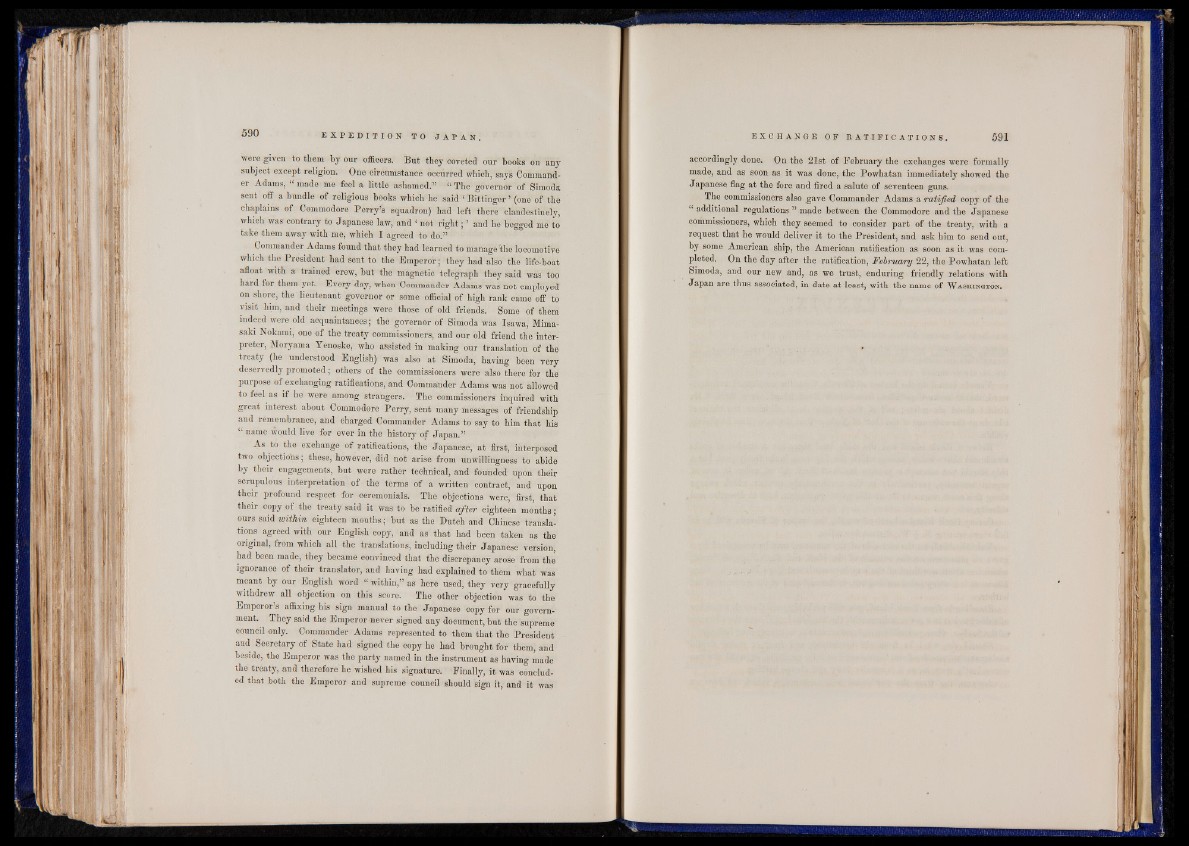
were given to them by our officers. But they coveted our hooks on any
subject except religion. One circumstance occurred which, says Commander
Adams, “ made me feel a little ashamed.” “ The governor of Simoda
sent off a bundle of religious books which he said 1 Bittinger ’ (one of the
chaplains of Commodore Perry’k squadron) had left there clandestinely,
which was contrary to Japanese law, and ‘ not right ; ’ and he begged me to
take them away with me, which I agreed to do.”
Commander Adams found that they had learned to manage 'the locomotive
which the President had sent to the Emperor ; they had also the life-boat
afloat with a trained crew, but the magnetic telegraph they said was too
hard for them yet. Every day, when Commander Adams was not employed
on shore, the lieutenant governor or some official of high rank came off to
visit him, and their meetings were those of old friends. Some of them
indeed were old acquaintances; the governor of Simoda was Isawa, Mima-
saki Nokami, one of the treaty commissioners, and our old friend the interpreter,
Moryama Yenoske, who assisted in making our translation of the
treaty (he understood English) was also at Simoda, having been very
deservedly promoted ; others of the commissioners were also there for the
purpose of exchanging ratifications, and Commander Adams was not allowed
to feel as if he were among strangers. The commissioners inquired with
great interest about Commodore Perry, sent many messages of friendship
and remembrance, and charged Commander Adams to say to him that his
“ name would live for ever in the history of Japan.”
As to the exchange of ratifications, the Japanese, at first, interposed
two objections; these, however, did not arise from unwillingness to abide
by their engagements, but were rather technical, and founded upon théir
scrupulous interpretation of the terms of a written contract, and upon
their profound respect for ceremonials. The objections were, first, that
their copy of the treaty said it was to be ratified after eighteen months ;
ours said within eighteen mouths; but as the Dutch and Chinese translations
agreed with our English copy, and as that had been taken as the
original, from which all the translations, including their Japanese version,
had been made, they became convinced that the discrepancy arose from the
ignorance of their translator, and having had explained to them what was
meant by our English word “ within,” as here used, they very gracefully
withdrew all objection on this score. The other objection was to the
Emperor’s affixing his sign manual to the Japanese copy for our government.
They said the Emperor never signed any document, but the supreme
council only. Commander Adams represented to them that the President
and Secretary of State had signed the copy he had brought for them, and
beside, the Emperor was the party named in the instrument as having made
the treaty, and therefore he wished his signature. Finally, it was concluded
that both the Emperor and supreme council should sign it, and it was
accordingly done. On the 21st of February the exchanges were formally
made, and as soon as it was done, the Powhatan immediately showed the
Japanese flag at the fore and fired a salute of seventeen guns.
The commissioners also gave Commander Adams a ratified copy of the
“ additional regulations ” made between the Commodore and the Japanese
commissioners, which they seemed to consider part of the treaty, with a
request that he would deliver it to the President, and ask him to send out,
by some American ship, the American ratification as soon as it was completed.
On the day after the ratification, February 22, the Powhatan left
Simoda, and our new and, as we trust, enduring friendly relations with
Japan are thus associated, in date at least, with the name of W ashington.